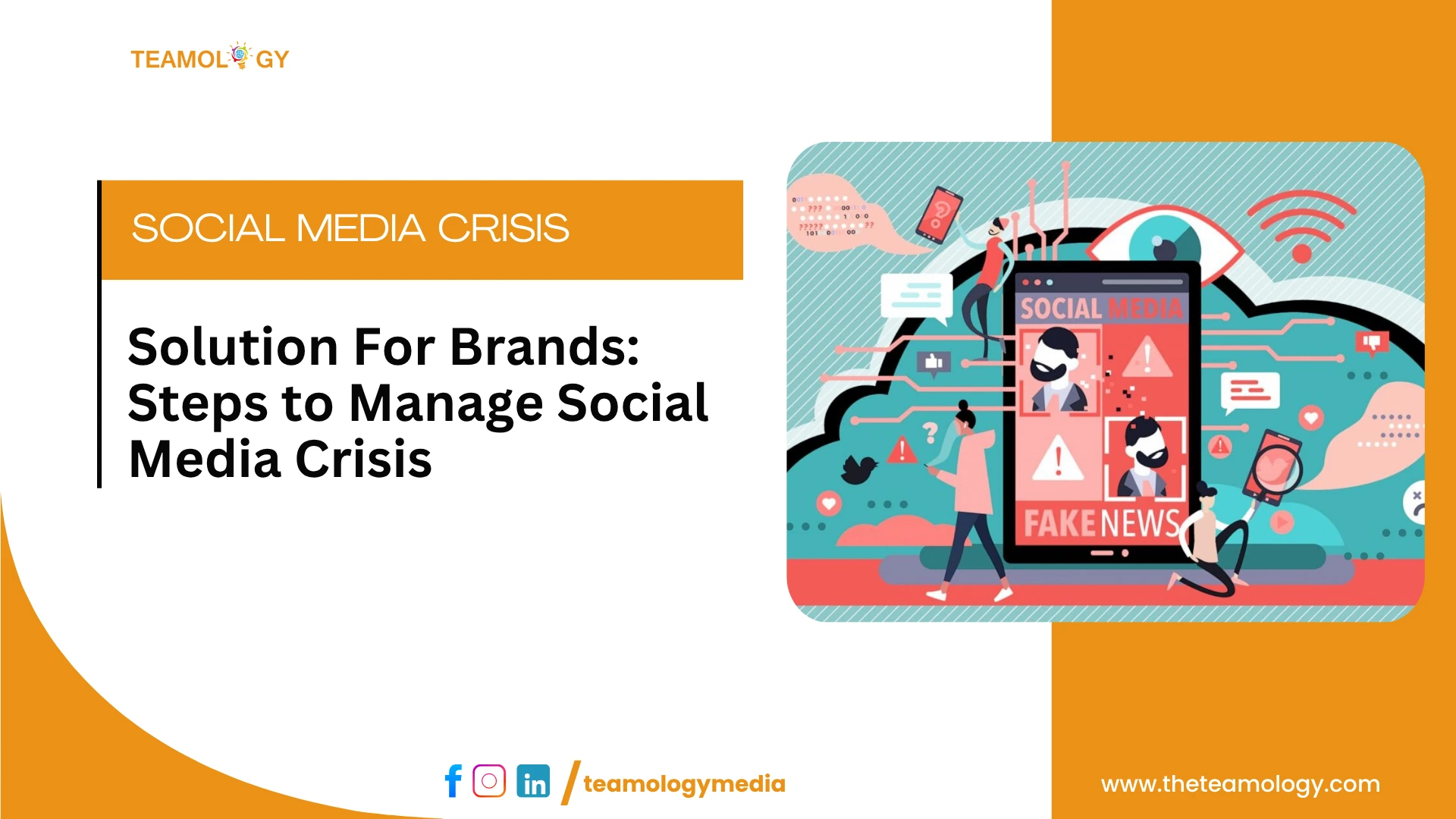Social media backlash can seem like a brand’s worst nightmare, but it doesn’t have to be. With preparation, authenticity, and thoughtful communication, brands can not only recover but also build stronger relationships with their audience.
So what happens when your brand is suddenly at the centre of an internet storm? How do you bounce back when the comments section becomes a battlefield? Whether it’s a bad ad, a poor customer experience, or simply a misjudged post, backlash on social media is something no brand is truly safe from.
The good news? You can come back stronger—if you know what to do. A well-thought-out, premeditated social media crisis management blueprint can save your ship when the storm hits.
In this blog, we’ll break down the causes of social media backlash, why it really matters, and most importantly, how to manage a social media crisis.
What Is Social Media Crisis and Why Does It Matter?
A social media crisis happens when a brand faces sudden, widespread criticism or negative reactions online. It usually happens due to a controversial post, an insensitive campaign, a product failure, or a poor customer experience. This backlash can spread quickly across platforms like Twitter (X), Instagram, Facebook, and LinkedIn, often amplified by influencers or media coverage.
Why Does Social Media Crisis Matters?
- Impacts on Brand Reputation: Years of brand-building can be damaged in hours, with the backlash permanently linked to online search results and social media mentions.
- Loss of Customer Trust: Consumers today expect brands to act responsibly. A lack of accountability or a poor response can lead to boycotts, cancellations, or negative reviews. This can hurt your brand reputation in the long run.
- Business Impact: Backlash can directly affect sales, partnerships, and investor confidence, especially if left unaddressed.
- Viral Damage: Unlike traditional media, social media is instant and global. A single mistake can trend worldwide in minutes and can impact your brand reputation.
In today’s digital-first world, brands must be prepared not just to manage backlash but to recover and rebuild stronger than before.
Root causes of Social Media Backlash?
Most social media backlash and crisis incidents are triggered by specific mistakes that can be avoided with better planning, cultural awareness, or audience understanding. Below are the most common root causes:
1. Insensitive Content on Social Media
One of the most common causes of backlash is posting content that violates social norms and values. This can include using sensitive issues such as race, gender, mental health, or global tragedies. Sometimes, brands try to use humour or edgy messaging to stand out, but without understanding the cultural context, it can backfire. Audiences today are more socially aware, and they expect brands to communicate with empathy and responsibility.
2. Poor Customer Service or Product Experience
Bad customer experiences can easily go viral through social media. A single tweet or video showing rude behaviour by a staff member, delayed deliveries, or faulty products can trigger a widespread wave of criticism. Brands that ignore or mishandle these complaints often make matters worse. To negate the sudden social media backlash you need to be prepared beforehand and act accordingly.
3. Miscommunication or Misinformation
Miscommunication among the employees may happen due to poor coordination and unclear messaging. This can result in the publication of false or misleading news, affecting a brand’s overall reputation. Customers feel misled, leading to online criticism and questions about the brand.
4. Controversial Partnerships or Endorsements
Collaborating with the wrong influencers or companies can damage a brand’s reputation. If the other brand has a history of unethical behaviour, offensive remarks, audiences will question the brand’s values and motives. Therefore, brands need to build partnerships with the right companies.
5. Failure in Response
Once a social media backlash begins, silence can be dangerous. Ignoring the growing criticism, deleting comments is dangerous as it can more severely impact the reputation. People want to see that a brand is listening, learning, and taking real steps to make things right.
By understanding these root causes, brands can avoid common pitfalls and build a more thoughtful, respectful presence on social media.
Steps of Social Media Crisis Management?
With the right brand strategy, brands can become stronger. Follow the given steps to build a strong, effective plan to manage social media backlash:
1. Develop a Social Media Crisis Response Plan
The best way to manage a crisis is to be ready for it. Every brand should have a clearly defined social media crisis plan. You must build a social media crisis management plan before any backlash occurs. This should include:
- Build a designated crisis response team (PR, marketing, legal, and leadership)
- Developing a crisis communication policy for employees
- Assignment of roles to employees for PR, marketing, and legal teams
- Identification of potential risks and response scenarios
Having a plan in place ensures your team knows exactly how to act under pressure and helps to avoid missteps in the heat of the moment.
2. Monitor Conversations in Real-Time
The correct way to deal with backlash and manage your online reputation starts with understanding what is happening with your brand. Rather than focusing on numbers, caring about how the comments are looking, and what the buzz is around your brand is more important.
Timely detection of negative sentiment can help you control the damage. Implementing social media tools like Sprout Social or Hootsuite can help you monitor brand mentions, hashtags, comments, and sentiment in real time. Early detection allows you to intervene before a small issue goes viral, giving you greater control over the narrative. Tracking customer sentiment, top posts, and influencer reactions will help you assess the severity of the backlash and prioritize how you respond.
3. Act Quickly and Accurately
Speed matters, but so does accuracy. Respond within the first few hours, even if you don’t have all the answers yet. A holding statement like “We’re aware of the situation and currently reviewing it—more updates soon” helps buy time and shows accountability. Avoid rushing into full statements without confirming the facts of the issue, because it could worsen the situation.
4. Acknowledge the Problem and Apologize Genuinely
If your brand made a mistake, a genuine apology to the audience is necessary.
- Acknowledge the issue clearly to the audience
- Express your regret sincerely
- Explain the steps you’re taking to fix it
- Sharing what you’ll do to prevent future issues
Avoid vague phrases like “We’re sorry if you were offended”. Communicate with your audience in empathy and clarity. Customers are found to be forgiving when brands are honest and human.
5. Choose the Right Platforms for Communication
Address the issue where it started. If the backlash began on Twitter (X), post your response there first. But don’t ignore other platforms—share a consistent message across all your social media accounts, your website, and possibly an email to your subscribers if needed. You may consider a video from your CEO or founder to add a more personal, emotional touch. This personal approach can make a big difference in perception.
6. Fix the Problem at Its Core
Behind every social media backlash lies a root cause. You must conduct an internal review and involve all relevant departments to understand what actually went wrong. Identifying the root cause will help you correct it at its source. Then, you should share with your audience the relevant updates on the actions you’ve taken. This transparency builds credibility and reassures your audience that real change is happening.
7. Rebuild Trust Through Consistent, Authentic Action
After the initial apology, your brand must show that it’s learning and evolving. You can update company policies, launch training programs, develop strategies aligned with audience needs, and publish regular progress updates. Your actions should speak louder than apologies. Moreover, long-term consistency will help you regain trust.
Final Thoughts
Getting hit by a social media crisis isn’t the end of your brand; it’s a chance to show your values, take accountability, and rebuild trust with your audience. You should remember that people don’t expect perfection; they expect responsibility. You should remember your faults and improve them for a better future. The brands that survive after backlash are the ones that respond with honesty, transparency, and action. Has your brand ever faced a tough online scenario? Let us know how you handled it or what you’d do differently next time. Need help building a better social media crisis plan? Reach us today! We can help you build an effective social media crisis response plan and navigate the crisis effectively.


